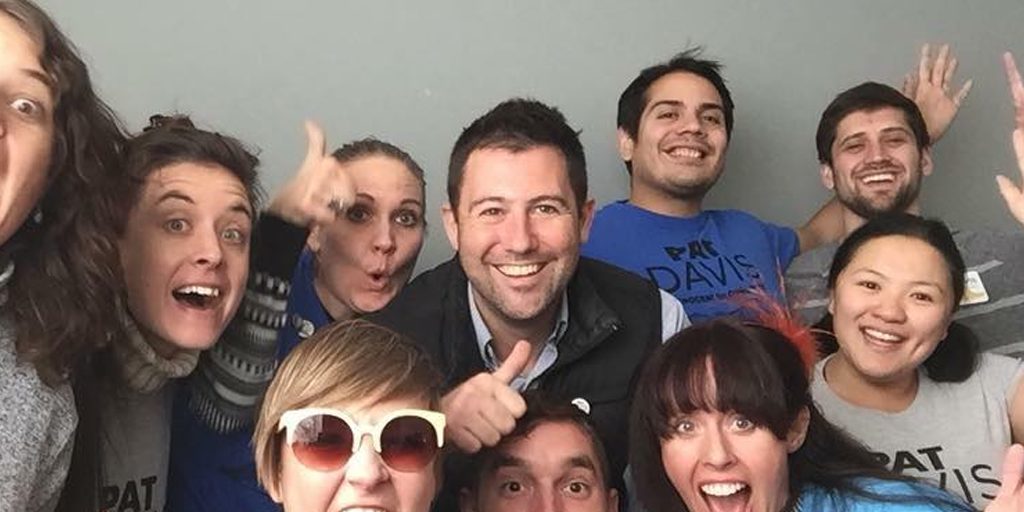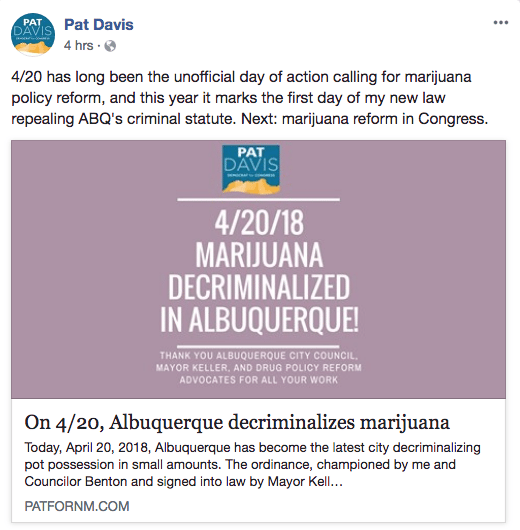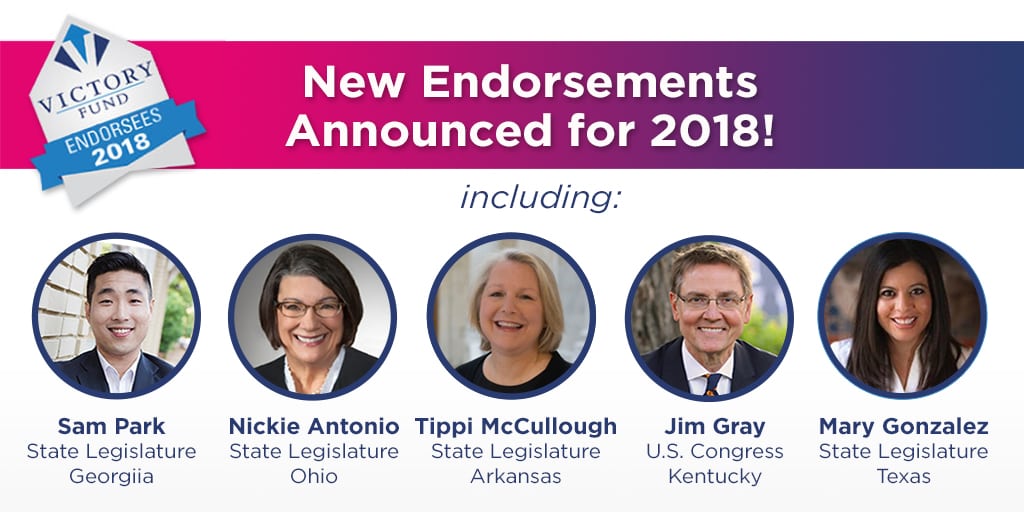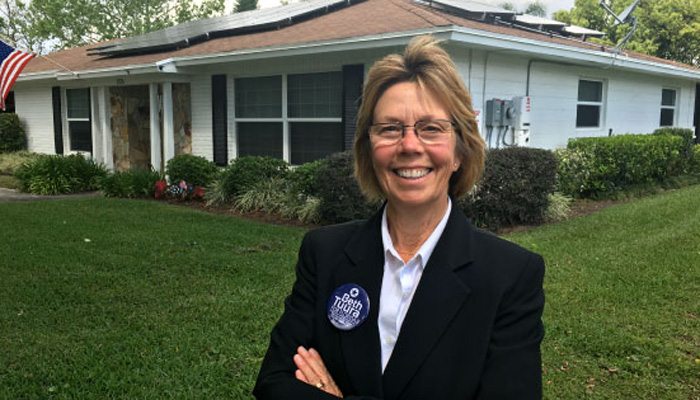
Today, Albuquerque joins 50 other U.S. cities that have passed measures to decriminalize marijuana, a measure City Councilor Pat Davis had been working since 2012. This week the City Council passed a resolution that prevents Albuquerque’s police officers from asking a person’s immigration status during traffic stops or arrests and limits their ability to cooperate with federal immigration officers. (See clip.) Pat Davis is a former police officer who’s made drug policy and immigration central issues in his campaign for this safe Democratic district.
The seat became open when U.S. Rep. Michelle Lujan Grisham decided to run for Governor of New Mexico. Pat faces 5 Democratic challengers ahead of the June 5 primary and these legislative victories are sure to help him stand apart. A 2016 poll found that 61% of likely voters in Albuquerque supported marijuana legalization, 34% opposed. Though NM-01 is a progressive district, public support for marijuana decriminalization is growing nationwide.

We recently sat down with Pat Davis at the Victory Fund National Champagne Brunch on April 8, 2018. Here’s his take on LGBTQ leadership, having a police background, and working across the aisle.
Why is it important that we have LGBTQ officials elected into office?
Diverse voices have been leading the resistance around the country. It’s incredibly important that when we take back the House, we do it with a voice that matches the American people. Folks like me, the gay official and the police officer, we’ve been passing sanctuary city legislation to help our immigrants, gun laws that actually work to protect our families and our community, and those are exactly the fights we have to win in Congress if we are going to stand up to Paul Ryan and Donald Trump. That’s why it’s so important that diverse voices are included in this conversation.
How does your experience as a police officer – I can’t imagine all of the ways that impacts your work – but how does that help you, in particular, to connect with people?
Most folks are surprised to learn that the uber-liberal guy passing marijuana decriminalization and sanctuary city and everything else, started out as an uber-conservative police officer. But it turns out, that experience was exactly what I needed to open my eyes and turn me from a law and order style of policing. You know, they only gave us one tool: how to arrest people. It turns out we weren’t helping those communities very much.
And so now, when I walk in a room and we talk about gun violence or if I walk in a room and we’re talking about police reform, I’m not the uber-liberal guy who’s coming with an agenda. I’m coming with a set of experiences and can be the moderator in the middle. And thanks to that, we’ve passed police oversight legislation in our city, we’ve passed new recruiting standards that ensures the police live up to our community’s expectations and look like the community that they are serving.
And it helped me pass gun legislation and drug reform legislation like marijuana decriminalization. Sometimes the best voices we have are the folks who were working on the ground and saw the real impact and can say, “you know what, I was trained to do it this way. It turns out, we need some more work.”
Have you been able to open the eyes of people who use to be in your position?
Absolutely. You know, it’s a good lesson for where we’re going with Congress. Unapologetically, uber-liberal progressive guy in the city council, with a Republican mayor who ran on ending our city’s sanctuary city status and did before I got there. But when Donald Trump required police departments to start serving as ICE agents – the progressive wing of the council and the right conservative wing looked at ways that we could sit down with the mayor to sign legislation that could protect them.
At the end of the day, we got legislation out that Democrats and Republicans supported, that allowed the Republican mayor to sign that legislation and still protect our community. That was sort of the value of saying that I was a cop and I know how these work, and our police officers don’t want to be spending their time doing this.
And so, in Albuquerque, with a Republican mayor, we passed the most ambitious climate change legislation in the country and a $50 million solar project, and the president of the city council is an oil and gas company vice president, and he voted for it. And we did it because it helped create jobs in his district, and he got a win on jobs and I got a win on climate. And I think those are the kind of examples that we need for leaders around the country. It’s critical to start with conversation as opposed to rhetoric.
Q: We are here with all kinds of LGBTQ elected [officials] and candidates. What is it about being part of our community that makes you a better leader?
The cool thing about being gay or LGBTQ is that, unlike so many other minorities, when you walk in a room, people don’t know that right away. We have to come out, when we’re knocking on doors or getting on the phone with folks, we come out 50 to 100 times a day to community groups. And you have to find a way to insert that. It’s very different. And so the opportunity is that, a lot of us can walk into a room with credentials and change people’s minds with what they think about LGBTQ leaders.
It’s also incredibly important that as more people come to understand our movement, it’s not just silos around racial inequality or religious inequality, but we’re all fighting these same fights together. And the other side knows that we’re all united. They’re coming after us to divide us. As we step up and in this room today with hundreds of LGBTQ elected officials, we’re stepping up and showing that we can be the diverse leaders that help redefine where our country is going and open the doors for other folks.
You know, when I was first – when I first ran for office 10 years ago, I was a young cop nominated by the party to run for sheriff. We didn’t have a single openly gay official in a state like New Mexico. Today, we have more than 20. And I have been a city councilor, and now get to be a front-runner for Congress. That shows you how far we’ve come in a decade. Because now being LGBTQ is not a handicap, it’s a value that allows you to have a relationship with communities who don’t yet have champions in their own yet. They know that we’ll stand up and fight for them just like they’ve been there for us.

